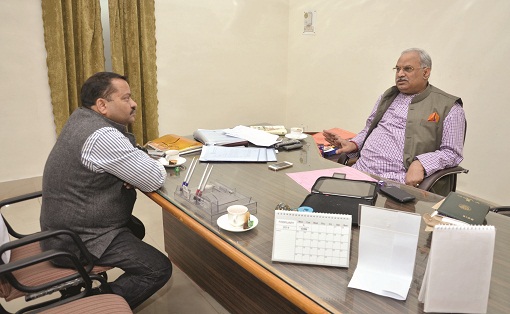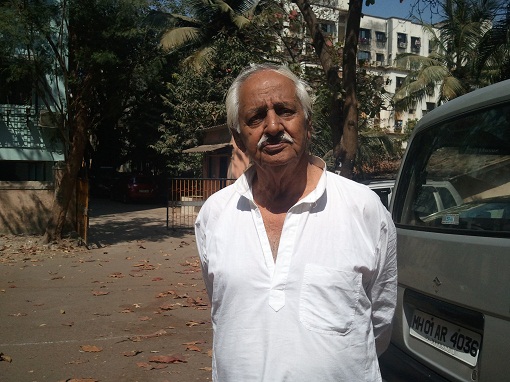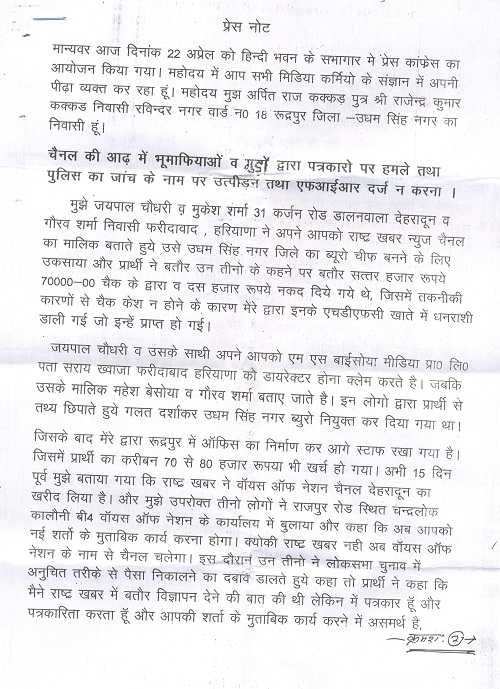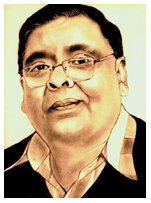: Stand-alone premises throw up wrong conclusions : The new chairman of Press Council Of India, Justice (retired) Markandey Katju, has demanded opinion poll on the present role of the electronic media. The elementary lesson on logic makes it clear that stand-alone premises give bizarre conclusions. “Is news media ignoring poverty and highlighting trivia; does it need to be controlled?”, may get 90 per cent positive response. But when put in context “should media be controlled by Government apparatus or by those directly, or indirectly, appointed by the Government in para-statal bodies?”, it will receive 99 per cent response in emphatic “no”.
Similarly if you put another question “Who is, in your perception, morally more correct –a Judge who refuses, on ethical grounds, a post-retirement position or a judge who immediately laps up a position?”, the answer would be in favor of the first one. Legally speaking there is nothing wrong in taking up post-retirement government assignment but weighed on the balance of legitimacy, it puts the person on wrong side of ethics. Those who know the elementary logic would say these premises are in the nature of perception rather than truth.
That suggests that public perception on stand-alone premise more often than not tends to throw up wrong conclusion. Ram Mandir would have replaced Babri Mosque long back should the parameter for determination of truth have been “referendum”. Judges would have been replaced by periodic voting and parliament and state legislature would have assumed unimaginable powers over all institutions including judiciary.
John Stuart Mill had said “if all mankind minus one were of one opinion and one person were of the contrary opinion, mankind would be not more justified in silencing that one person than he, if he had the power, would be justified in silencing them” .
The Indian media is being subjected to stand alone premise and stand-alone responses these days. An attempt is sought to be made to denigrate this institution and also to shackle it into submission.
Recently, a news channel was taken off air, when it aired a news item in which a DIG of UP Police had written about the corruption rampant in the Government. For doing this, the simple act that bureaucrats resorted to was to ask the District Magistrates to force the cable operators to do the job. Nothing illegal as no one can question the Government as nothing is in writing. The weak cable operator can be any day hauled up for laying cable illegally. This fear can make the operators pliable.
What is more shocking is the attempt of the powers-that-be to tarnish media image at a time when this non-state institution is serving, or as government accuses, espousing a major public cause –the anti-corruption movement.
The latest report of the Centre For Media Studies (CMS) says “reporting on corruption in news media between the year 2010 and 2011 has doubled. It further says “During July-September, 2011 alone the coverage more than tripled”. If a question is asked “whether media did a good job by raising public consciousness against corruption “ 99 per cent response would be positive.
Contrast this with renewed bid of the Government besides a para-statal organisation. The media, thus goes the stock allegation, has been showing Lakme fashion shows ignoring abject poverty.
In a liberal democracy, institutions do put pressure on other institutions and sometimes there are inter-institution tussles also. It is a healthy trend that paves the way for course correction. It was the criticism from the society that galvanized Indian electronic news media into developing its own self-regulatory mechanism two years ago under the widely acclaimed former Chief Justice of India Justice J S Verma. It is in the same process that all editors sat together and formed the Broadcast Editors’ Association (BEA).
In the past two years the BEA took many decisions for course correction. The balanced coverage of Ayodhya judgment, the decision not to cover Gopalgarh riots except for giving bare news sans any communitarian identity in the visuals, the collective resolve not to cover private affairs like Ashwarya Rai’s delivery, or cremation of Azaharuddin’s son are some of the examples of how Indian media has embarked on course correction exercise.
In a recent revolutionary decision Indian news channels have also resolved to do away with all shows of astrologers within one month including the shows on religio-festive occasions. No special shows with Babas talking about Dhanteras or Solar Eclipse.
Indian electronic news channels are barely 16 years old. It takes time to develop self-propelled institutions that can effectively generate collective consciousness for “dos” and “don’ts”. It will hardly take another three years to develop Indian news channels as a robust public-service oriented institution. But the BEA is committed to make this institution an example to be followed across the globe.
At such a time when electronic news media is going the whole hog for course correction, any attempt to denigrate it will be to the detriment of democracy. The Government will be more than happy if media remains in the same old “entertainer’s role”. The Government and the powers-that-be get more alert when the media takes up public cause.
The threat from an interventionist state can well be witnessed from the fact that while the First amendment to the US Constitution re-inforced Press Freedom making it unassailable for all times to come, the first amendment to Indian Constitution introduced “incitement to an offence” as eighth restriction to this freedom within the very first year of operation of the Constitution.. As an obvious consequence that came about in quick succession, the Press (Objectionable Matters) Act, 1951 was introduced. In the following 18 months, 130 cases were registered against the newspapers.
In the recent past and more specifically in post-Anna phase, media have witnessed a fresh spate of tirade from not only political class but also other institutions and their honorable representatives. There is nothing wrong in it. Such inter-institutional tussles do give rise to an urge for self- corrective process. The Indian media instead of taking umbrage at such tirades, many of which are not logically or factually correct, should look inwards and try to analyze itself without any self-righteous indignation. The test of efficacy of any institution is determined by the amount of public utility it carries and not by what aggrieved institutions say.
In order to provide quality content and in view of media’s responsibility to the society , the Broadcast Editors’ Association (BEA) has been striving to improve quality and to a great extent not only the Union Minister for Information and broadcasting but the people also have acknowledged these efforts. However, it only irks the powers-that-be when media goes all out to espouse a change in the corruption system. We are being blamed for being solely responsible for hyping Anna’s anti-corruption movement. Janata Dal leader Sharad Yadav’s speech in thye Lok Sabha in which he repeatedly said “Yeh dibba band karao” shows the unrest even among the opposition against the media in general and electronic channels in particular. Referring to coverage of A Raja a la 2G spectrum, Prime Minister too had rued against media saying the media became prosecutor, investigator and judge.
Contrast this perception of the Indian powers-that-be with the views of Thomas Jefferson (in his letter to Edward Carrington) in 1787 “ …and were it left to me to decide whether we should have a government without newspapers, or newspapers without a government, I should not hesitate a moment to prefer the latter”.
N.K Singh
General Secretary,
Broadcast Editors’ Association
Email- [email protected]





